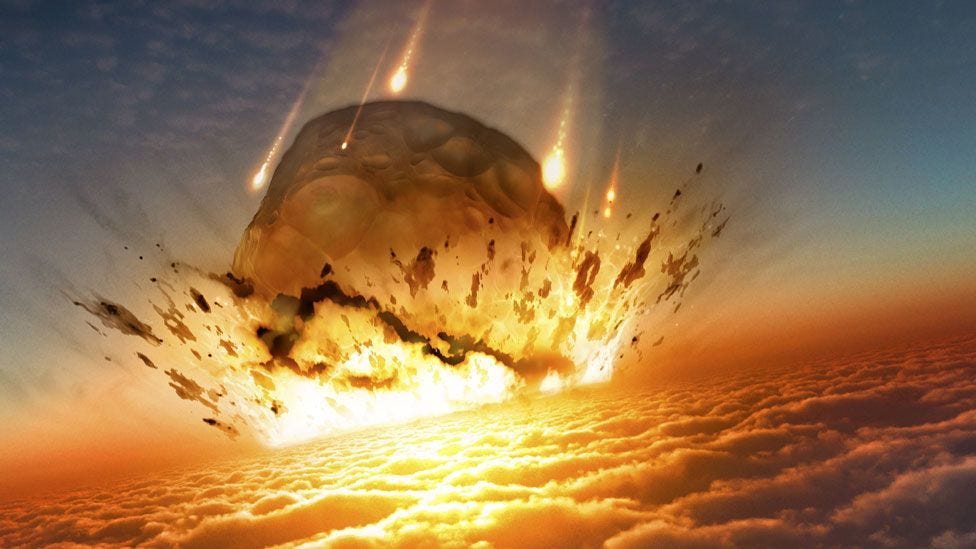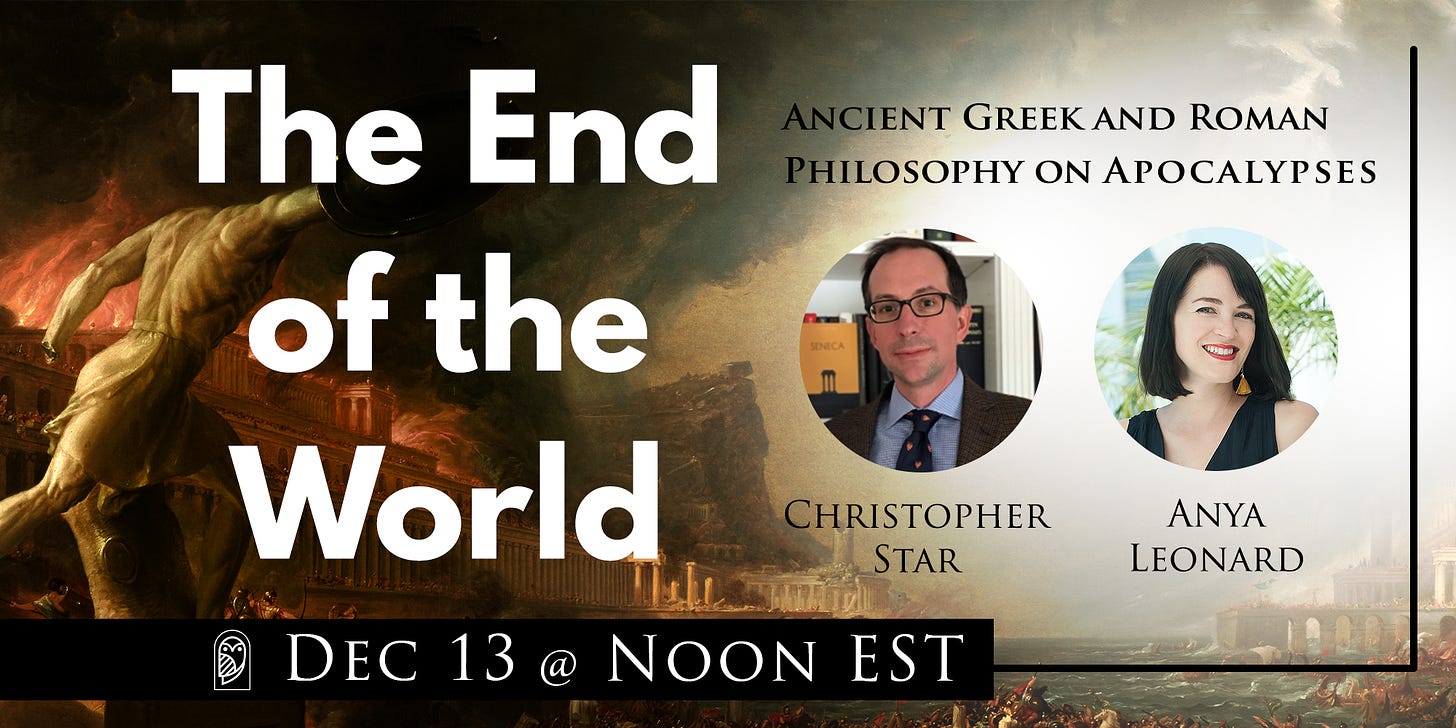Dear Classical Wisdom Reader,
I have a tendency to write to you from the end of the world (el fin del mundo)... but this time, I’m writing about the end of the world.
No, I’m not recapping my dramatic weekend out in the countryside without running water, electricity, or a car... while an epic storm flooded the house.
It may have felt like the end of the world... but fortunately it wasn’t.
I’m talking about the tendency to “Immanentize the Eschaton.”
For those unfamiliar with this term created by the Classics devotee Eric Voegelin, it essentially means, ‘to bring about the end of days’; Eschaton is the final, heaven-like stage of history, whereas Immanentize means to render something abstract/transcendent real or actual.
Now, that may seem like an odd desire: to will the conclusion of all life as we know it... and it is. Don’t get me wrong! Nonetheless, you will find strewn throughout history this feeling, or indeed hope, to somehow be the last witnesses of the world.
It goes back to the ancient world, referenced in Hesiod and Virgil, discussed by a wide range of great thinkers including the Pre-Socratics, the Atomists, Epicurus, Plato, and the Stoics.
You see it at times of great production (it was a very prevalent feeling during the Industrial Revolution and influenced philosopher Karl Marx a great deal)...as well as moments of ‘stagnation’. Art history fans may recall the huge boom of Romanesque churches built in anticipation of the year 1000 as true believers prepared for the medieval version of Y2K.
It’s a concept that has been employed by church and state alike, on varying scales, and in widely differing forms. You can detect it in doomsday cults, technophobia, mutual destruction by atomic warfare, climate change, etc. Indeed, the extinction movement has imbued a whole generation that the end is nigh (is it 12 years now? Or 11?)
In fact, a Reuters poll in 2012 found that nearly one in four Americans and one in seven worldwide believe the world will end during their lifetime. In the UK the figure was less than one in 12.
That’s a lot of people who don’t just think the world revolves around them, they think it stops around them too… and I can only imagine those numbers have increased significantly in the last decade.
So... why do we do this...even today? What is it about human nature or politics that creates such an ambition? Why will the end of days?
As always, you can write me directly at anya@classicalwisdom.com or reply to this email.
NB: If you’d like to learn specifically about the ancient philosophical traditions regarding apocalypses (and wow! Are there many!), make sure to register for tomorrow’s event at Noon EST:
Save your spot here: https://The-end-of-the-world.eventbrite.ie
It will certainly be an interesting conversation... In the meantime, please enjoy your fellow Classics lovers' responses to last week’s question:
Is Pride Virtuous? Is Damaged Pride Dangerous? Should it be condoned... or condemned?
Have a wonderful week!
Kind Regards,
Anya Leonard
Founder and Director
Classical Wisdom
P.S. If you took advantage of our special holiday offer and you haven’t heard from me regarding your address, PLEASE Check your spam/promotions folder or write to me directly at classicalwisdomweekly@gmail.com.
Monday Mailbag
Is Pride Virtuous? Is Damaged Pride Dangerous? Should it be encouraged... or condemned?
This reminds me of my reading of Aristotle's Nicomachean Ethics, in which he speaks of the "Great Souled Man," who is one focused on the work and its virtue and not on him/her self. Usually, in a virtuous way, the Great Souled Man does not recognize greatness; it is others who do so. Such a magnificent person does not focus on his/her own magnificence, and when s/he does, virtue is lost. From my perspective, when one focuses on the prideful self, especially with regard to materiality as well as accomplishments, depression will follow. For such a reason we have many pharmaceuticals, yet, we strive for immortality which brings us back to Plato's Cave.
--Herman H, San Francisco
-
Pride, like many attributes of the human condition, is on a continuum. One should have pride in their chosen field or endeavor. For instance, I remember my former high school football coach on a hot summer day questioning me when he saw me running. I had long left high school and was not competing in college. He asked me "why are you out here running?" I simply answered "pride." His reply was interesting, "we don't have much of that here anymore." It sounded like he was a little jaded on the pride that he was seeing with his school youth at the time.
The point is that I still had pride in my body's performance and function. That stays with me today. Then there's hubris, in which people "mail it in" when doing a task or think they are bigger, better, or (fill in the blank) than others. This is what the ancients warned us about. Pride is a great gift, but it needs to be modulated and not turned up too high, or you can hit hubris. With hubris, all types of bad things can happen to people, countries and civilizations.
Glenn C.
The word "pride" as used in the English language today, has a variety of distinct meanings, and without going to a dictionary I will mention the following:
hubris - the confidence that the rules don't apply to me, that I can get away with improper actions
arrogance - despising others, or at least considering oneself as better than others
self-confidence - I know that I am competent, capable, and worthy
honor - as in, "he was too proud to cheat or lie"
competitiveness - not necessarily bad, but generally the focus is not on being one's best, but simply beating whoever is against you. This includes by whatever means necessary. Cheating, lying, bribes - none of this matters if "your" team wins.
Some of these are positive, and some are very negative, but we really need to be clear about which of these meanings we have in mind when we speak of pride. The desire for wealth, fame, popularity, power, and the lusts of the flesh are nearly always rooted in negative aspects of pride.
Gordon F.
Cuenca, Ecuador
-
Pride is the sun that entered the world through the failure of Adam and his wife Eve. It is the source of all the misery and entropy observed in Creation. Pride goeth before a fall and a haughty spirit to destruction.
Damaged pride is a compounding of pride. God approached the brothers Abel and Cain to bless them by having them bring him an offering according to His instructions. When they did, He would bless them. Abel complied. Cain did not. Cain brought a fabulous offering, but it was not what God instructed. He sought favor by out doing his brother, not complying with instructions. When God rejected Cain’s offering, He could not bless Cain. All Cain had to do was correct his error and receive the blessing. God warned him his pride was sin crouching at the door. His pride wounded, he took Abel out and literally chopped him into little pieces. Far worse than simple murder. Such is the inheritance of pride wounded. It is worse than the anger of a woman scorned.
To condone pride or wounded pride is to increase the practice that is sin literally tearing apart, not just people and civilization, but the very fabric of creation itself. As in the Days of Noah… this sin permeated the entire world to the nth degree just as unfortunately it does now today and I suspect similar consequences will soon manifest.
Charles F.
-
Proud is a virtuous, self-fulfilling and transitory emotion as a result of a human accomplishment and or action.
Pride is the vain attempt to capture and maintain that lofty, loving feeling beyond being proud.
Petrovich
-
Encouraged or “condoned”? Perhaps condemned? Condoned appears twice incongruently…just so you know….
Thanks for this and all the others. Always interesting.
Jillian Lynn L.
Mayne Island BC
Ops... too true. I should have said condemned... or curbed... or dissuaded. I’ve fixed it. Thank you for letting me know!







"In fact, a Reuters poll in 2012 found that nearly one in four Americans and one in seven worldwide believe the world will end during their lifetime. In the UK the figure was less than one in 12."
Yes, it is now climate change that will end civilization as we know it AND people are not having children because of this impending apocalypse. Fortunately my children aren't quite as idiotic and my 12 grandkids will be living in the great world of the future!
My dearest Anya,
It is not the end of the world if you live to see it. Only death can bring about el fin del mundo. Therefore, anyone wishing to "Immanentize the Eschaton" seeks death which is non-transcendent. So... Why? Is there more to living than just life?
Respectfully yours.
Darrell